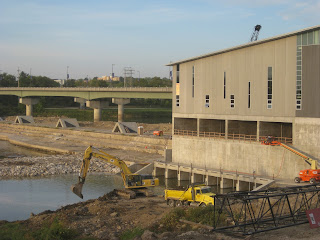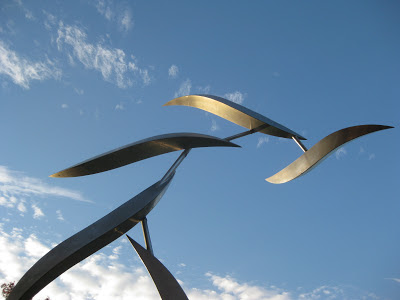Bowersock Hydroelectric Powerhouse
on the north bank of the Kaw River,
Lawrence, Kansas, 2011 - 2012
Click on photos to
view them full-sized.
Link at the bottom of
page to photos inside
North Powerhouse.
The idea of harnessing the power of water that falls from
the sky and then flows ever downstream to the ocean has been around for a long
time. The Bowersock Mills and Power Company has been doing that on the south
bank of the Kaw River since 1874. Now they’re spending roughly $25 million
dollars to build a North Powerhouse.
Here’s the thing: What is done must be done.
I walk across the Kaw River Bridge nearly every day and I
have watched mostly men doing this thing. The only woman I noticed, as she
sometimes walked across that bridge, was the relatively small woman who heads
Bowersock now. The rest of the workers were men, roughly my height and weight.
And I also saw their machines – trucks and backhoes and
cranes and more - also made by human hand.
I can’t begin to tell you about everything that was done,
but believe me, everything that was done on that north bank of the Kaw and
extending across the river was done by the hands of men and, through the
extensions of their hands, with tools that they controlled.
We live in a culture in which clicks seem to make amazing
things happen.
Imagine if you can, a man handling a crane many times his
height. Just the tops of the tracks that creep and scrape the crane along the
earth and rock are nearly at eye level. Other men on the ground hook a hook onto
a long steel pile many times their height and weight and then the crane
operator hoists it into the air, other men maneuvering it into its precise
place, so that the pile driving tool that has been suspended from the crane can
driving that steel pile into the river bed. Then the process is repeated over
and over, one pile driven precisely next to the other around the perimeter of
the work site, the crane and the men working atop a platform of dirt and rock
that they have constructed themselves extending out into the river. Then men
operating bulldozers and backhoes pile more dirt and rock against the steel
wall, all of this simply to make it possible for these same men to lay the
foundation of the power plant fifty feet below the surface of the river.
In the hole they then dug day after day, they worked, scraping
the river bottom, finally drilling holes with an auger nearly as wide as their
bodies are thick to a depth many times their individual height down to the
bedrock to anchor the power plant they will build to the earth. Each hole was filled
with steel rebar and concrete. Then the floor itself was laced with layer upon
layer of steel rebar and yet more steel rebar. Then several feet of concrete was
poured over all of it - just to make the floor. They started the pour for that
floor in the early morning, lights hooked to generators, just in case, so that
the contents of perhaps a hundred cement trucks could be transferred though a
concrete pumping truck in one day. In other stages of construction, concrete
was moved by way of a huge bucket dangling at the end of another of a steel
cable from another crane.
Now consider this: this giant of a crane also had to be
anchored to the earth with more augered holes and steel and concrete and then erected
high into the air, a piece at time, so that a man could climb up the long ladder
at the beginning of the work day to sit high in the cab, moving his hands to
move the machine that would move the material around the work site.
If this seems complicated beyond belief, trust me, you
haven’t heard the half of it.
This tall crane hoisted steel forms, panels perhaps twice as
wide as a man is tall and three or four times as tall, occasionally with men
holding on to ropes on the corners as the panel was lowered into place so that
the wind wouldn’t catch the panel and slam it into more men who were clambering
on webs of rebar as they formed up the massive walls.
One floor. Walls. The second floor, where the turbines would
be placed in four holes roughly the diameter that a man is tall. Then more
walls, and then the third floor and more walls and finally the fourth floor which
would hold the generators that will generate the power. Every ton of steel
reinforcing, every ton of concrete, was hauled from somewhere else to this
place and placed precisely where it belonged.
In case you’ve forgotten, each ton is roughly ten times each
worker’s body weight. And the forms and the scaffolding and the tools also had
to be moved. And the men also had to move their own bodies.
Internal combustion engines and electrical power were significant in this construction, but if you watched this power plant being
built, you could not fail to notice how much of the doing was done with human
muscle and brain. And those tools that extended the reach and power of those human
workers, they too, came from the same source - brain and muscle.
I’ve barely begun to tell everything. Earth was moved to
divert the river while men built another concrete and steel framework for a pressurized
rubber tube dam that would hold the river back at an additional depth of about
the height of a man. The men cut through the steel and concrete along the top
of the existing dam with diamond saw to lay pipes for air that would inflate the
dam. It took time and, to reinforce my own point, the material with which this
power plant was built - the steel and the concrete – also only came out of the
earth through human effort. And the transportation, over distances great, as
well as many here as small as an arms length. Sometime fractions of an inch
mattered.
Prefabricated steel and concrete beams and panels were lifted
into place for the generator house. And then stainless steel roofing. And glass
for the windows. And the turbines, and the shafts and the generators
themselves. Four of them, each one three times bigger than one of the seven generators
in the south unit. And the electrical hardware, conduits and wires. The earth was
moved and unmoved. And moved and unmoved again.
The giant crane came down. The steel piles were vibrated
back out. The dirt and rock removed, a backhoe scoop and truckload at a time.
Long days. Almost every day in July, to take one extreme
month, was hot – a hundred degrees hot.
I walked across the bridge and those men worked, for roughly
a year.
Soon, if the rain comes, with a click on a mouse or
keyboard, electricity will flow to tens of thousands of homes.
The earth, the raw materials, the rain, the forces of
nature, even our human ingenuity, we were given all of that.
We human beings - some of us – make the tools and do the
work. Men and women do the lifting, the manipulating of materials, the step by
step building of what has been imagined. At every point, human hands directed
by human brains an arm’s length away were required to build this power plant.
Look at the men in some of the photographs again. Then look
at what they did. It was my privilege to watch them work. Believe me when I
tell you that I haven’t told you the half of what they did.
But as has always been true, what is done must be done.
Link to Inside Bowersock North Blogpost
Twelve additional photos taken from inside the power plant.
A forty page book with essentially the same photos and writing is available through Amazon, directly from the author, with limited copies at The Raven. More info at Bowersock book.
Link to Inside Bowersock North Blogpost
Twelve additional photos taken from inside the power plant.
A forty page book with essentially the same photos and writing is available through Amazon, directly from the author, with limited copies at The Raven. More info at Bowersock book.










































